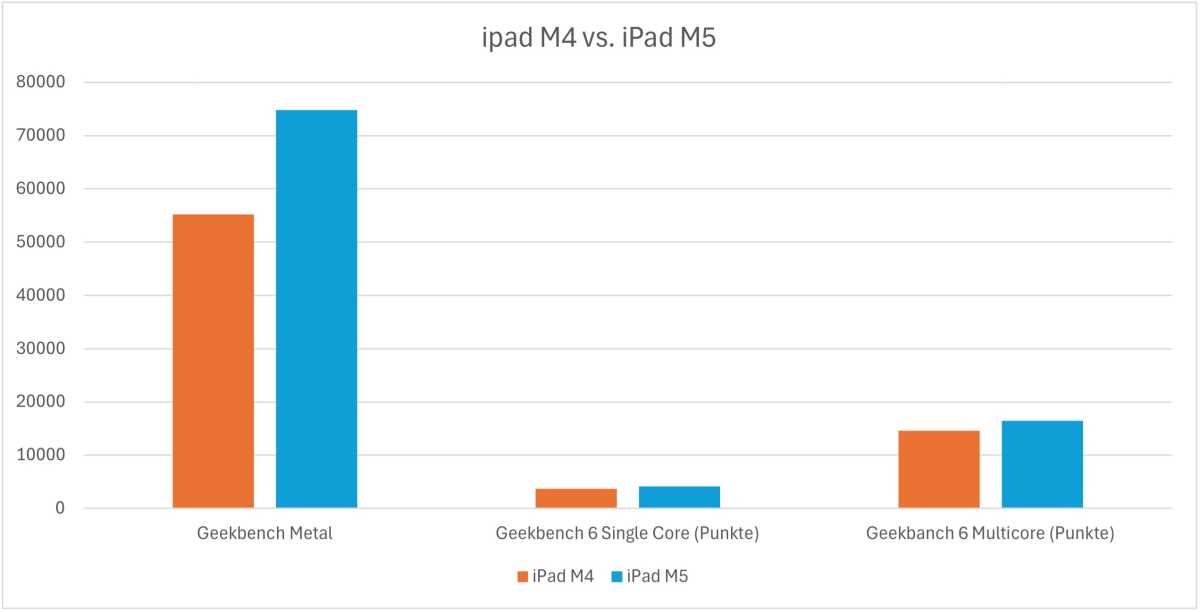iPad Pro (M5) review: Still great, now with boosted graphics and AI performance
Description

At a glance
Expert's Rating
Our Verdict
The new iPad Pro M5 is the best tablet on the market. The display is significantly better than the other iPads, and Apple’s good keyboard case makes a MacBook superfluous for many users. It also offers more performance in AI applications and more RAM for the entry-level models. However, an upgrade from the M4 model is not necessary, and the much cheaper iPad Air M3 is a strong competitor.
Pros
- First-class display
- Outstanding performance
- Good battery life
- Fast Thunderbolt interface
- New optimizations for AI applications
Cons
- Incremental performance boost over M4
- Cellular support via eSIM only
Price When Reviewed
This value will show the geolocated pricing text for product undefined
Best Pricing Today
Best Prices Today: Apple iPad Pro 11-inch (M5, 2025)
Product
Price
Price comparison from Backmarket
When Apple introduced the iPad Pro M4 just over a year ago, it came with a host of new features and a completely new design. The premium tablet stands out from the iPad Air with its thinner design, great OLED display, and faster chip. But Apple just replaced the iPad Pro’s M4 chip with an M5 chip, and overall, the new M5 iPad Pro offers small improvements.
Design and display
With the iPad Pro, Apple has succeeded in designing an elegant and thin profile that is nevertheless very robust and high-quality. The 13-inch model is only 5.1 millimeters thick; the 11-inch model is 5.3 millimeters.
The quality and workmanship are first-class, and thanks to the robust aluminium housing, the device is likely to make a presentable impression even after many years of intensive use. Incidentally, it is only possible to distinguish between the M4 and M5 iPad Pros by a small detail: only the M4 model has a model label on the back, the M5 model lacks a serial number and model number. However, Apple’s Smart Keyboard for iPad Pro (released in 2015) is not compatible with the M4 and M5 models, and users with old accessories will have to purchase a new keyboard cover (in two colors) and a new protective cover.
The switch to OLED display technology helps save a lot of space in the iPad Pro. For comparison, the 13-inch iPad Air, which has an LED display, is a full millimeter thicker than the 13-inch M5 iPad Pro. The iPad Air is also noticeably heavier at 682 grams, compared to the iPad Pro’s 579 grams. As a mobile device, the iPad Pro has an advantage.
 <button class="lightbox-trigger" type="button">
<button class="lightbox-trigger" type="button"><svg fill="none" height="12" viewBox="0 0 12 12" width="12" xmlns="http://www.w3.org/2000/svg">
<path d="M2 0a2 2 0 0 0-2 2v2h1.5V2a.5.5 0 0 1 .5-.5h2V0H2Zm2 10.5H2a.5.5 0 0 1-.5-.5V8H0v2a2 2 0 0 0 2 2h2v-1.5ZM8 12v-1.5h2a.5.5 0 0 0 .5-.5V8H12v2a2 2 0 0 1-2 2H8Zm2-12a2 2 0 0 1 2 2v2h-1.5V2a.5.5 0 0 0-.5-.5H8V0h2Z" fill="#fff"></path>
</svg>
</button></figure>
Eugen Wegmann
The iPad Pro’s OLED is a first-class display. Apple uses a Tandem OLED panel, and with its brightness support up to 1,000 nits, this is around twice as bright as the iPad Air, and can even increase the brightness to 1,600 nits for HDR content, a real advantage for HDR photos or HDR videos. The adaptive refresh rate of 1Hz to 120Hz Pro Motion is also supported.
The display impresses with first-class colors and image sharpness, making the IPS panels of the other iPads seem almost a little outdated. For color-critical tasks such as professional image editing or video editing, the iPad Pro offers a special “reference mode” in which the iPad uses reference colors for common color standards and video formats. If you use this mode, color adjustments such as Night Shift and True Tone are automatically switched off. Calibration with an external device is also possible. In contrast to the iPad Air models, the Dolby Vision, HDR10, and HGL color profiles are also supported.
The 1TB and 2TB models can also be equipped with nano-textured glass for an extra $100/£100, which significantly reduces reflections. However, this also makes the displays somewhat more sensitive to scratches.
CPU and GPU performance
The iPad Pro is equipped with Apple’s very latest chip, the M5. Compared to the M4 chip, the M5 chip offers some interesting new features: The memory bandwidth increases from 120GB per second to 153GB per second, and it also offers better dynamic caching and faster ray tracing. The latter enables faster gameplay and more realistic visual effects.
 <button class="lightbox-trigger" type="button">
<button class="lightbox-trigger" type="button"><svg fill="none" height="12" viewBox="0 0 12 12" width="12" xmlns="http://www.w3.org/2000/svg">
<path d="M2 0a2 2 0 0 0-2 2v2h1.5V2a.5.5 0 0 1 .5-.5h2V0H2Zm2 10.5H2a.5.5 0 0 1-.5-.5V8H0v2a2 2 0 0 0 2 2h2v-1.5ZM8 12v-1.5h2a.5.5 0 0 0 .5-.5V8H12v2a2 2 0 0 1-2 2H8Zm2-12a2 2 0 0 1 2 2v2h-1.5V2a.5.5 0 0 0-.5-.5H8V0h2Z" fill="#fff"></path>
</svg>
</button><figcaption class="wp-element-caption">
The graphics performance in particular has increased in the M5 models.
</figcaption></figure>
Stephan Wiesend
Our testing shows that the M5 CPU is slightly faster than the M4 it replaces. The M5’s Geekbench scores were 4144 (single-core) and 16,503 (multi-core), which is almost 12 percent higher than the M4. Good, but not really a r






